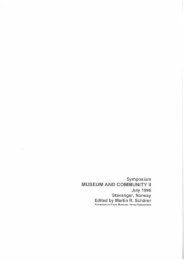Key Concepts of Museology - ICOM
Key Concepts of Museology - ICOM
Key Concepts of Museology - ICOM
You also want an ePaper? Increase the reach of your titles
YUMPU automatically turns print PDFs into web optimized ePapers that Google loves.
54<br />
Etymologically speaking museology<br />
is the ‘study <strong>of</strong> the museum’ (or<br />
museum studies), and not its practice,<br />
which is museography. But the term<br />
museology and its derivative museological,<br />
accepted in its wider sense in<br />
the 1950s, now has fi ve clearly distinct<br />
meanings.<br />
1. The fi rst and most commonly<br />
accepted meaning applies the term<br />
museology to anything relating to<br />
museums and generally listed, in<br />
this dictionary, under the heading<br />
museal. Thus one might speak <strong>of</strong><br />
the museological departments <strong>of</strong> a<br />
library (the reserved section or the<br />
numismatic cabinet), museological<br />
questions (relating to museums) and<br />
so on. This is <strong>of</strong>ten the meaning used<br />
in Anglo-Saxon countries, which has<br />
even spread from North America<br />
to Latin-American countries. Thus,<br />
where there is no specifi c recognised<br />
pr<strong>of</strong>ession, such as in France where<br />
the general term curator (conservateur)<br />
would be used, the term museologist<br />
applies to the entire museum<br />
pr<strong>of</strong>ession (for example in Québec),<br />
in particular to consultants given the<br />
task <strong>of</strong> drawing up a museum project<br />
or creating and staging an exhibition.<br />
This use is not favoured here.<br />
2. The second meaning <strong>of</strong> the<br />
term is generally accepted in many<br />
western university networks and is<br />
close to the etymological sense <strong>of</strong><br />
the word: museum studies. The most<br />
commonly used defi nition is that<br />
proposed by Georges Henri Rivière:<br />
“<strong>Museology</strong>: an applied science, the<br />
science <strong>of</strong> the museum. <strong>Museology</strong><br />
studies its history, its role in society,<br />
the specifi c forms <strong>of</strong> research and<br />
physical conservation, activities<br />
and dissemination, organisation<br />
and functioning, new or musealised<br />
architecture, sites that have been<br />
received or chosen, its typology<br />
and its deontology” (Rivière, 1981).<br />
In some ways museology contrasts<br />
with museography, which refers to<br />
the practices attached to museology.<br />
Anglo-Americans are generally<br />
reluctant to accept the invention <strong>of</strong><br />
new ‘sciences’ and have favoured<br />
the expression museum studies, particularly<br />
in Great Britain where the<br />
term museology is still rarely used<br />
to date. Although the term has been<br />
increasingly frequently applied internationally<br />
since the 1950s, along with<br />
the increased interest in museums, it<br />
is still rarely used by people who live<br />
with museums on a daily basis, and<br />
the use <strong>of</strong> the term remains limited<br />
to people who observe the museum<br />
from the outside. This use <strong>of</strong> museology,<br />
widely accepted by pr<strong>of</strong>essionals,<br />
has gradually established itself<br />
in Romance countries from the 1960s,<br />
replacing the term museography.<br />
3. From the 1960s in Central and<br />
Eastern Europe, museology gradually<br />
came to be considered as a<br />
genuine fi eld <strong>of</strong> scientifi c research<br />
(albeit a developing science) and an<br />
independent discipline examining<br />
reality. This view, which greatly<br />
infl uenced ICOFOM in the years<br />
1980-1990, presents museology as<br />
the study <strong>of</strong> a specifi c relationship<br />
between man and reality, a study in
















